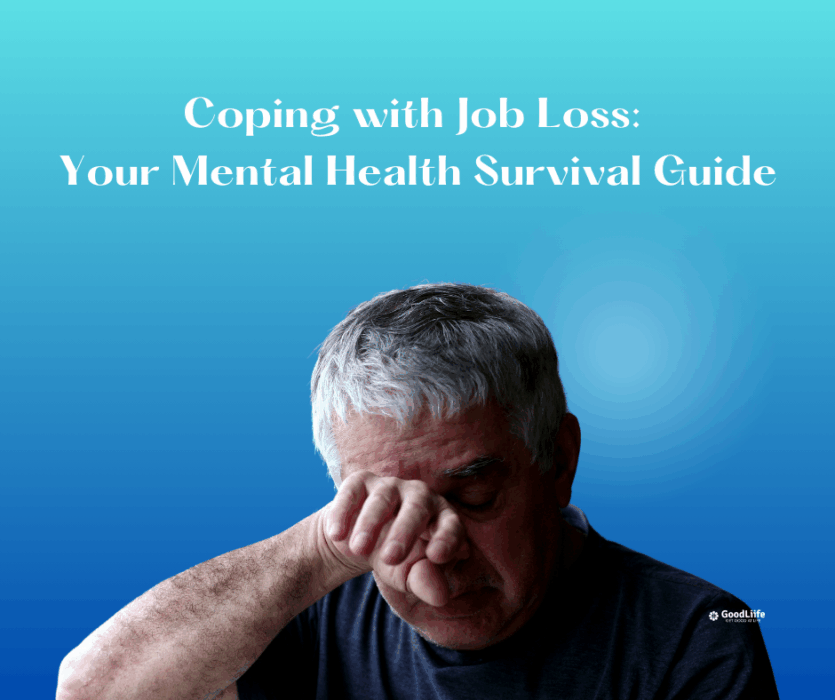Losing a job is more than just a professional setback—it can feel like a personal crisis. Beyond the sudden financial pressure, there’s a loss of identity, routine, social interaction, and self-worth. If you’ve recently been laid off, you’re likely dealing with a rollercoaster of emotions: shock, fear, anger, confusion, and even shame.
And while you might be tempted to jump straight into job applications, it’s essential to first care for something more foundational—your mental health.
Why? Because how you feel emotionally affects how you think, act, and plan. A stable mind is your greatest asset during times of uncertainty. And though it may seem hard right now, this unexpected pause can be a turning point—a chance to realign with what truly matters in your life.
This guide is here to help you not just survive, but begin to heal and grow. You’ll learn actionable tools to cope with job loss, nurture your well-being, and take small but meaningful steps toward a healthier mindset and a stronger future.
1. Acknowledge the Emotional Impact
Grief after job loss is real. You may go through stages similar to losing a loved one: shock, denial, anger, sadness, and acceptance. It’s important not to rush the process. Let yourself feel—but don’t isolate.
Try this:
Keep a daily mood journal to identify your emotions and triggers. Writing things down can bring clarity and emotional release.
2. Establish a Routine
Job loss often means the loss of daily structure. Without a schedule, it’s easy to spiral into fatigue, poor sleep, and procrastination. Building a routine can give you a sense of control and stability.
Daily essentials:
- Set a consistent wake-up and sleep time
- Schedule job search activities
- Include time for meals, exercise, and relaxation
- Avoid overloading your day—allow rest and breaks
3. Move Your Body to Shift Your Mind
Exercise releases endorphins, which are natural mood lifters that reduce stress and anxiety. Physical activity also improves sleep and boosts self-esteem—both of which can take a hit after job loss.
Start small:
- Take a brisk 20-minute walk
- Try yoga or stretching videos at home
- Dance to your favorite playlist
- Explore nature to calm your nervous system
4. Stay Connected to Others
Losing a job can feel deeply personal, and many people withdraw in shame or fear of judgment. But human connection is essential for emotional resilience.
Ways to reconnect:
- Talk to trusted friends or family about how you’re feeling
- Join a support group (in person or online) for job seekers
- Reconnect with former coworkers for encouragement and networking
You don’t need to navigate this alone.
5. Protect Your Self-Esteem
A job is what you do—not who you are. Still, it’s normal for job loss to shake your confidence. It’s important to remind yourself of your strengths, value, and potential.
Affirm your worth:
- List your accomplishments and strengths
- Ask for testimonials or recommendations from former colleagues
- Reflect on challenges you’ve overcome before—this is just another one

6. Set Small, Achievable Goals
Uncertainty can be paralyzing. The solution? Momentum through micro-goals.
Examples:
- Update your resume this week
- Apply to 3 jobs by Friday
- Reach out to one networking contact per day
- Take one free online course in your field
Each completed task helps restore confidence and purpose.
7. Limit News and Social Media
It’s easy to spiral into doom-scrolling, especially during uncertain times. But constant exposure to negative headlines or seeing others’ career milestones online can worsen anxiety and depression.
Digital boundaries:
- Set daily time limits for social media
- Follow motivational or career advice accounts
- Choose uplifting content over fear-based news
8. Practice Mindfulness and Stress Reduction
Stress is inevitable after a layoff, but chronic stress can damage your mental and physical health. Mindfulness techniques help you stay grounded and reduce emotional overwhelm.
Try this:
- Deep breathing (inhale 4 counts, exhale 6 counts)
- Meditation apps like Calm or Headspace
- Gratitude journaling
- 5-4-3-2-1 sensory grounding technique
9. Seek Professional Help When Needed
If sadness, anxiety, or hopelessness linger, speaking with a therapist can make a powerful difference. Mental health support is not just for crises—it’s a smart, proactive step during life transitions.
Look for:
- Free or affordable therapy services
- Telehealth options covered by insurance
- Coaching or counseling specific to career transitions
10. Reframe This Moment as a Turning Point
Though painful, job loss can also be a pause that leads to better alignment. Many people report that a layoff led them to:
- Discover new passions
- Pivot into more meaningful work
- Improve life balance
- Reclaim their health or creativity
You have the power to rewrite your story from here.
GoodLiife Score Tip: Check In with Your Whole Life
Coping with job loss isn’t just about updating your resume or landing the next role—it’s about rebuilding the foundation of your life. That’s where the GoodLiife Score App can make a real difference.
This powerful self-coaching tool gives you a clear snapshot of your life across 8 essential categories:
- Health – Are you taking care of your physical and emotional well-being?
- Environment – Is your space helping or hurting your ability to recover?
- Leisure – Are you making time for activities that bring you joy and relaxation?
- Purpose – Do you feel a sense of meaning, even outside of a job title?
- Growth – Are you using this transition to learn, reflect, or explore new paths?
- Relationships – Are you surrounded by people who support and uplift you?
- Occupation – Are you rethinking what kind of work truly fulfills you?
- Wealth – Are you managing resources in a way that reduces stress and creates stability?
After taking the Score, you can use the app’s LifeBook feature to reflect on your thoughts, set weekly or monthly goals, and track your emotional recovery. It’s like having a wellness coach in your pocket—ready whenever you need clarity or motivation.
Whether you’re feeling stuck or just need a gentle push forward, the GoodLiife Score helps you reconnect with your life holistically, making sure that your comeback is not just about a new job—but a better, more intentional life.
Conclusion: You’re More Than Your Job Title
Job loss can shake your confidence and challenge your sense of identity—but it doesn’t define your future. What you’re going through is tough, but it’s also temporary. The way you care for your mental health during this time will shape how you rise from it.
Take it one step at a time. Build small routines. Lean on your support system. Give yourself permission to rest, reflect, and rebuild. This period of uncertainty may just become the space where clarity, strength, and reinvention are born.
And remember, you’re not alone—and you’re not starting over. You’re starting again, with experience, wisdom, and a deeper understanding of what matters.
With the right mindset and the right tools—like the GoodLiife Score—you can turn this setback into a powerful new beginning.
You’ve got this.
